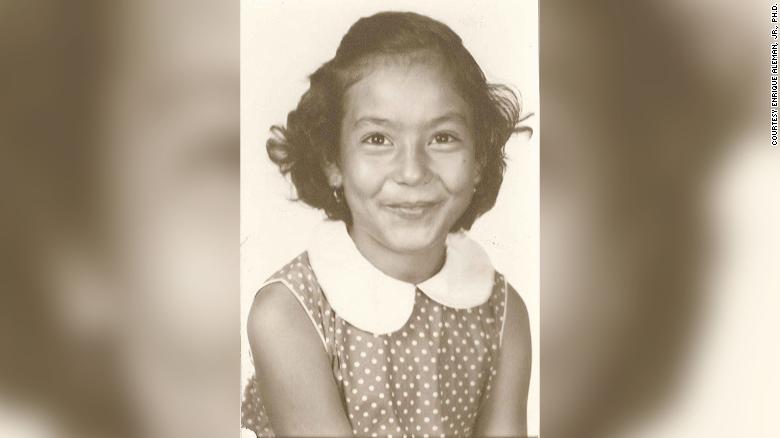Analyst asks to question prejudices and be self-critical 1:16
San Antonio, Texas (CNN) -
Decades after Lupe Alemán was forced to repeat first grade three times, her son is doing his life's work to reverse racial inequality in schools.
Enrique Alemán Jr., 50, has spent the past several years talking to numerous students in Texas and across the United States about how his mother and other Mexican-American children from Driscoll, Texas, were treated by officials in the 1950s. schoolchildren who claimed they could not speak or understand English.
Lupe Alemán, in the top row and second from the right, was several years older than some of her peers when she started third grade in the 1957-1958 school year.
A school policy forced her and other Mexican-American children to enroll in first grade for several years.
But a controversial law that goes into effect Sept. 1 will restrict the way social studies teachers in the lone star state discuss race.
The law could also make it difficult to debate why Lupe Alemán and at least seven other children went to federal court in the year after the landmark US Supreme Court ruling
Brown v.
the Board of Education
in 1954.
"I think it is a great harm for students of all races not to talk about the uncomfortable aspects of our history. And it is especially bad for young Latinos not to understand that Texas has been a violent, racist and discriminatory place to live," he said Alemán Jr. to CNN.
While Texas lawmakers have been embroiled in a battle over election laws in recent months, legislation against "critical race theory" has been another priority for Republicans in the state.
In June, Republican Gov. Greg Abbott signed HB3979, and an expanded version of that bill is currently being considered by the state Senate in a second special legislative session that began Aug. 7.
New order in Texas targets immigrants 2:42
HB3979 states that social studies teachers cannot "require" or include in their courses the concept that "one race or sex is inherently superior to another race or sex" or the concept that "an individual, by virtue of of their race or gender, is inherently racist, sexist or oppressive, whether consciously or unconsciously. "
It also points out that "a teacher cannot be forced to talk about a certain current event or a widely debated and currently controversial issue of public policy or social affairs."
Teachers, according to the bill, also cannot demand or give additional credits for a student's political activism.
advertising
Legislation proposed by Senate Republicans, SB3, seeks to extend the restrictions to all teachers, regardless of subject or grade.
Mexican American children sue their school and won
In 1955, a group of children and their parents sued the Driscoll Consolidated Independent School District for placing Mexican-American children in first grade over a three-year period solely because they were of Mexican descent, according to the federal lawsuit.
The Driscoll School District, a town of nearly 800 people about two hours south of San Antonio, said in court that the students were only placed in separate classrooms due to their lack of English proficiency. School officials said that deprived other students of the teachers' attention and instruction, and it was not because of their country of origin, court documents show.
After several students appeared in court to testify that they were fluent in English, US District Judge James V. Allred ruled in 1957 that it was unreasonable to place students in separate classrooms based on their race or origin.
Lupe Alemán was a fourth-generation Texan and was fluent in English when she and her sisters enrolled in first grade at a school in Driscoll, Texas.
CNN contacted the current superintendent and members of the Driscoll Independent School District board of directors for comment on multiple occasions.
Alemán Jr. was about 10 years old when he picked up his mother's high school yearbook and she shared two details of her life that, at the time, she did not understand.
As a child at Driscoll, Lupe Alemán was part of a court case, and by the time she graduated from high school she was almost 21 years old, Aleman Jr. says her mother told her.
It was more than two decades later that Alemán Jr. realized what his mother was referring to.
Alemán Jr. was 33 years old when he watched a television documentary about Héctor P. García, a Texas civil rights advocate who founded the American GI Forum, a group that helped Mexican-American veterans fight discrimination. .
The documentary chronicles Garcia's life and activism, including how the group filed a federal lawsuit in the mid-1950s against the Driscoll school district.
Lupe Alemán was 20 years old when she graduated from high school in Bishop, Texas, her son says.
She was the school's first Mexican homecoming queen.
"I immediately had a
flashback
and remembered what my mother told me," he said.
His mother, who was born in Driscoll, lived there until she was a young adult and would be about 9 years old when the lawsuit was filed, Alemán Jr. said.
But he was unable to pick up the phone and ask his mother about the case.
His mother had died a few months before he saw the documentary, he said.
"He was shocked and upset," Aleman Jr. said, adding that his mother and two of his aunts testified in court.
"I didn't understand why no one was talking about it."
As Alemán Jr. continued his education and focused his research on the inequalities that black and dark-skinned students face in school, he couldn't forget about his family's history.
In 2012, he traveled through Texas to meet several of the children who testified with their mother for the
Hernández v.
Driscoll CISD
and produced a documentary called "Stolen Education".
He learned that some were punished for speaking Spanish at school or that they had seen their classmates being flogged by teachers.
Some graduated from high school and others dropped out of school to work or join the military, he said.
They moved on with their lives, Aleman Jr. says, but "there's still something about them that feels like they didn't reach their full potential because of the way they started."
Enrique Alemán Jr., center, with his parents Lupe and Enrique Alemán Sr. during their 1997 graduation from Columbia University in New York.
There has been a long struggle for ethnic studies in Texas
Educators and activists say they are concerned that the new law has negative implications for the decades-long effort to make the history taught in Texas schools more inclusive.
More than 52% of the 5.3 million children enrolled in kindergarten through 12th grade across Texas in the last school year were Hispanic or Latino, according to data from the Texas Education Agency (TEA). in English).
However, the curricular standards for teaching studies about Mexico and the United States, only as an elective course in high school, were only approved in 2018 after years of debate.
California school board passes anti-racism resolution after tortilla tossing incident at basketball game
Sonia Hernández, Associate Professor of History at Texas A&M University, who works with the nonprofit Refusing to Forget to shed light on the Texas Rangers' murders of Mexican Americans in the 1910s and decades. 1920, said he was saddened to see that an "unfounded idea" could become a setback for activists and educators in the state.
"So many years of great efforts are being pushed aside by the unfounded idea that if we talk about issues of racial inequality, if we talk about how certain groups of people were marginalized and treated as second-class citizens, even if they were indeed citizens Americans, that would lead to a kind of unpatriotic story, "Hernandez said.
"We are doing a disservice to our students, we are telling them that we think they are not intellectually equipped to understand a complex history of their own country," he added.
For Tony Díaz, an author and activist, the new law and efforts around "critical race theory" legislation echo the sentiment behind the Arizona law that banned studies on Mexico and the United States in public schools a decade ago.
"Those same trends have come back in a new form," said Diaz, who campaigned against the prohibition in Arizona schools by launching Librotraficante, a caravan to bring to Arizona the books prohibited by the same law.
Texas law is intended to intimidate teachers, Diaz says, and it will take a "very deep grassroots campaign" to overturn it.
Weeks before the new law takes effect, it is still unclear how schools will enforce it.
The TEA has yet to issue guidance for schools and the agency has not yet responded to CNN's request for comment.
The Aftermath of the Pandemic in US Hispanic Students
Angela Valenzuela, a professor of education policy at the University of Texas, said the law does not address how schools will implement or enforce it.
"I think ultimately it is intended to create division at the grassroots level to empower parents who feel their children are being harmed by teaching concepts like white supremacism, white privilege, the history of racism and slavery, "Valenzuela said.
For Alemán Jr., who is now a professor of education at Trinity University and teaches classes for educational leaders, the state's educational system has in part "never wanted Latinos, African Americans, and women to even know their part" in the history.
Learning what happened to his mother and other Mexican-American children at Driscoll changed the purpose of Alemán's work.
It also made him feel close to his mother, even decades after her passing.
It's empowering to know where you come from, and that feeling, she says, is something she hopes more Latinos and students of color can feel while in school.
Racial Discrimination Texas




/cloudfront-eu-central-1.images.arcpublishing.com/prisa/RULPYNDV5FMFMTRM6OUNH3K3BY.jpg)




